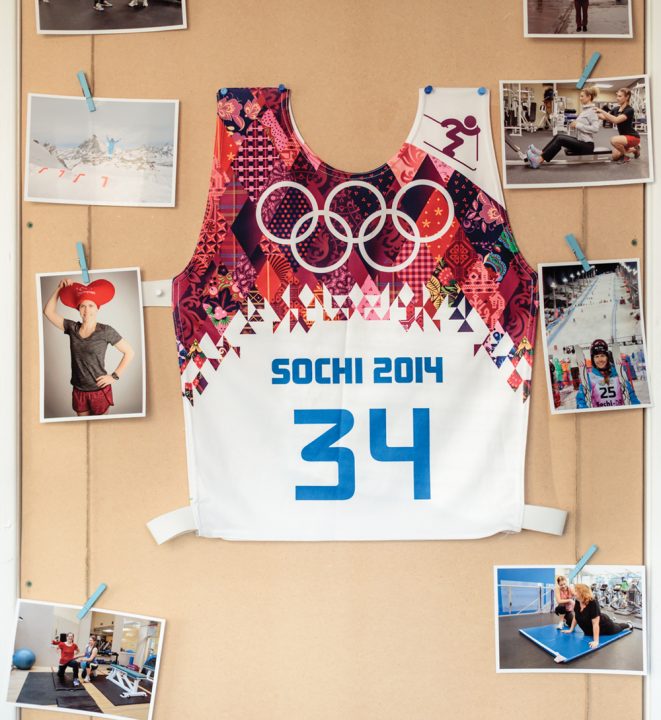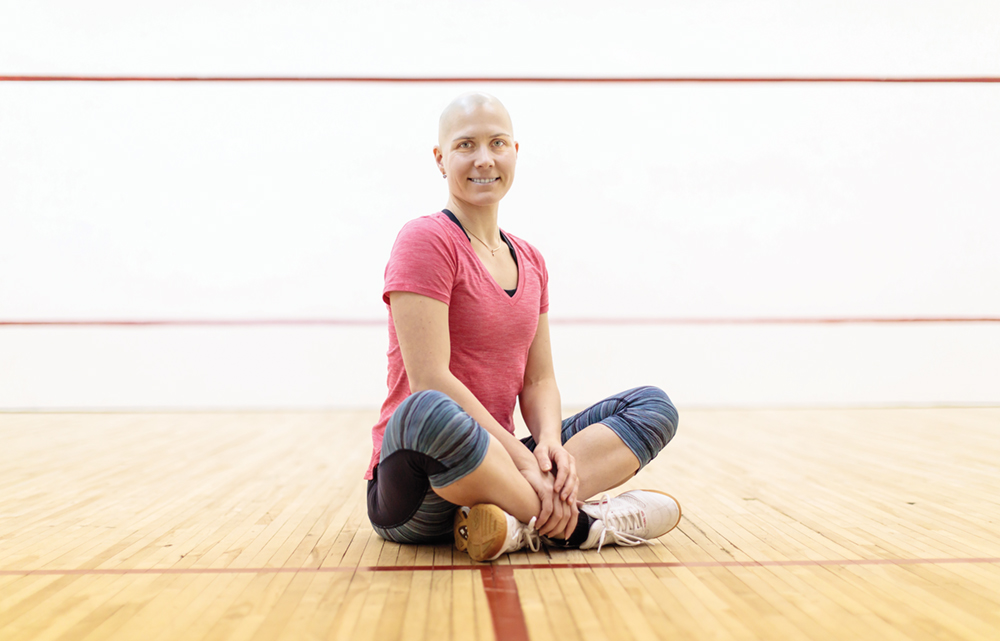
Skiing since the age of three through long, dark winters in the Murmansk Region of Russia, Elena Muratova followed the glow of the Olympic torch and found love in British Columbia’s Coast Mountains. Settled in Victoria B.C., Canada with her husband Ivan, Elena now helps others become their best physical selves.
What was your path to Sochi? When did you start skiing? I think I was around three years old when I started to ski. My dad was my coach; he was a competitive alpine skier and then he became a coach. I like to joke, actually, because both my parents are coaches. My mom coached figure skating and my dad alpine skiing, so I only had two choices: figure skating or alpine skiing. I was very little when I tried figure skating, but my dad was more interested in training me. My mom says that she liked to be just a mother to her kids, not a coach to them. My dad was pretty happy with that decision. But it was tricky in some ways sometimes because it is difficult when you come home and he is still your coach even at home. Dad was my coach until I was fifteen or sixteen years old, then I switched to freestyle skiing and it’s a different kind of sport from alpine skiing.
Did you join the Russian national team then? More or less. I was on the national team for ten years. Sport was my life. I tried different things but still came back to the sport because I missed it so much.
Was the 2014 Olympics in Sochi your first Games? I had this dream to go to the Olympics. I had a few knee surgeries that prevented me from going to the Olympics earlier. Of course I needed to qualify at the World Cup level first.
How did you feel when you made the team? I was very excited when I made the team—it was awesome—but it also was stressful because it was a home Olympics. Double pressure. Everyone was watching.
What was the response from your friends and family? It was amazing how many people remembered me and sent me messages—people who had known me in the past. It was cool, but our coaches said we had to stay away from social media starting a few weeks before the Olympics. I thought it was strange, but I took their advice. When the Olympics were finished for our sport, I went on to my social media and wow, there were so many messages! The coaches were right; it would have been overwhelming before the Games to deal with all those messages.
Were you happy with your performance at the Games? I placed 21st at Sochi and unfortunately, didn’t qualify for finals, but I was pretty happy just to be there. It was an amazing experience, difficult to express. One of our Russian guys placed 3rd. The emotions were so high—everyone was connected and we were crying and hugging at the finish line.
So was that it—the pinnacle? Had you realized your dream? Actually, after the Games, we went on to the World Cup Series. We didn’t just stop; life continued! I placed 2nd in the World Cup. It was the best result ever in my sport career. I had it in my mind already that I was going to retire after the World Cup. It was part of my life plan because of age, because of health—it is difficult for the body to train constantly. It was a big commitment for four years. The average age to retire from freestyle is around thirty years old. I also had met the man who would become my husband.

Falling in love is a good incentive to retire! Where did you two meet? We met in Vancouver. We had Canadian coaches for four years and we had some training camps in Vancouver and in Whistler. During one of the training camps, my teammates and I went to the shopping mall. I needed to buy a new dress for my sister’s wedding. My now husband was at the mall too and heard us speaking Russian. He approached us and started a conversation.
Is he Canadian? Was he an athlete too? Actually, Ivan is Russian. He came to Canada to study a few months before we met.
Wait, you travelled all the way to Canada to train for the Olympic Games in Sochi, Russia and fell in love with a fellow Russian in Vancouver?
I know. It’s crazy. It’s great that we met in Canada. It’s unbelievable how small the world is. He is originally from south of Moscow and I used to live maybe a fifteen-minute drive from his hometown. I had even visited his hometown when visiting a friend. Then we meet in Canada!
When did you arrive in Canada to stay? One week before our wedding. It was April 2014. I had the Olympic Games in February and then the World Cup and other competitions in Russia.
The Olympics, World Cups, and a wedding in three months? Must be the athlete in you. Ivan did most of the planning. I just bought my wedding dress and shoes. It wasn’t a big wedding. I had nobody in Vancouver. Actually, my mom and my dad watched our wedding from Russia via Skype. Our friend carried a laptop around! It was four or five a.m. in Russia and my parents were sitting watching, wine glasses on the table. It was kind of awesome. My mom said she really felt like she was there with us. My parents didn’t actually meet Ivan in person until after the wedding.
Why did you two decide to settle in Canada? When we decided to live together, we considered what options we had. Ivan’s parents had already settled in Burnaby and are now Canadian citizens. He had a plan here. He studied here. I wasn’t tied down to anything. I’ve always loved Canada. I have travelled to many countries, but Canada was always close to my heart. It does remind me of Russia, but I don’t know why. It’s difficult to describe. The nature reminds me of Russia.
And what led you to Victoria specifically? Ivan was accepted to Camosun College and we fell in love with Victoria. He found a job and I started my business here.
What is your new business? I am a personal trainer and help people to be fit, strong, and healthy. I have a degree in sports science. I love to train people, but I didn’t want to be a coach—and of course Victoria is not a good place to be a ski coach! Personal training seemed like a good opportunity. I can also apply my athletic experiences to help clients reach specific goals, like running a marathon or climbing Kilimanjaro. I usually train at the Quadra Sports and Fitness Gym, but sometimes I visit people at their houses, depending on their goals. My clients have all different levels of fitness. I had a client who is around 85. We worked mostly on preparing him for daily activities so he can be independent. His daughter asked me to train him because he had applied for an artificial leg and he had to be strong to qualify, which he did in the end. It’s not athletic training; it is more general fitness, but I can apply my experiences. Because of my own injuries and surgeries, I understand my clients’ recovery needs.

ELENA HERE IN CANADA
FIRST EMOTION UPON ARRIVING
Excitement.
MISS THE MOST
The food! Fortunately, now you can find Russian food in Victoria at Seven Valleys store on Douglas St.—the store has new owners from Azerbaijan. They import smoked mackerel, salted herring, buckwheat, candies, and Russian-style cottage cheese and sour cream. The Russian-style cottage cheese is very different from the Canadian style, which is salty. You would eat the Russian-style cottage cheese with some jam or something sweet. We often buy food in Vancouver too because there are Ukrainian, Russian, Serbian, and Polish stores there with more to choose from.
AT HOME
My husband is a good cook and usually cooks at home. He likes to experiment and loves to cook food from different cultures as well. He really enjoys it! It’s not typical in Russian culture for men to do the cooking, at least, in my family, the women usually do the cooking.
CULTURAL CONNECTION
It helps that I am married to a fellow Russian. That’s a big deal because we speak Russian at home. We also have Russian friends here. Unfortunately, we don’t have a Russian community centre or something like that here, but there are many groups, like Facebook groups or book clubs. We also Skype with my family all the time. I can’t imagine not having that. I can see my niece in Moscow growing up. I call my mom every week.
BIGGEST CHALLENGE
Language. Even though my English is good, it is still a challenge—it can still prevent me from expressing myself at a complex level. And talking with my clients, for example. They all come from different professions and of course I don’t know some words related to their professions.
ACCENT BIAS
It’s funny, I’ll say something to my clients or other people, and they’ll say, “What?” I’ll say it again and again until they realize what I’ve said. Then they’ll say the word the same way I just pronounced it! I understand it sounds different to them, but to me, it sounds exactly the same. But that’s not bias exactly. Actually I find Canada really great in this way, not discriminating.
WEIRD CANADIAN CULTURE
Personal space. You have big distance between people in lines, for example. You could easily fit two or three more people in that space! And everybody is so polite! Everyone is smiling in the streets here and I love this part very much. In Russia, if someone is smiling at you, something is wrong. But sometimes, people are so polite [here] they can’t tell you the truth. It’s frustrating—you can’t understand their real feelings.
FAVE ACTIVITY IN VICTORIA
Paddleboarding. Going to the beaches. I love the smell of the ocean.
IMMIGRATION ADVICE
Be careful with lawyers. We had a bad experience with a lawyer from Vancouver. If you speak English, you can call an immigration centre and get answers to your questions. When you are immigrating, you are limited in your budget. Spending a few thousand dollars on things you can do by yourself is not good. Our lawyer actually came referred to us, but did not seem very knowledgeable and used scare tactics. Some people do need a lawyer, so my advice would be to be cautious, think twice, and not take advice blindly.

